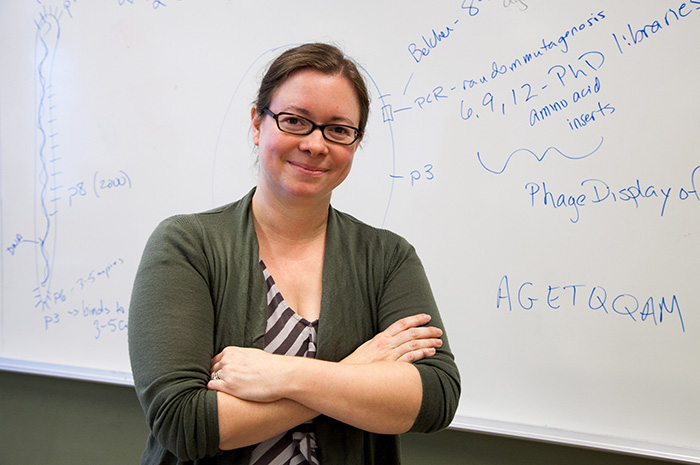Stressed Out?

Assistant Professor of Chemistry Rebecca Connor was recently awarded a National Science Foundation grant to research cellular responses to stressors.
NSF-funded research investigates cellular responses to stressors and how to control them
by MaryAlice Bitts-Jackson
When cells are exposed to stressors—fever, infection, very warm or cold climates, oxygen deprivation or disease—a protective system, the heat-shock response, kicks in. By producing proteins that regulate cellular function, this system works to protect and repair cells in times of crisis.
In a scientific study that connects the research areas of pharmacology, toxicology and basic biochemistry, Assistant Professor of Chemistry Rebecca Connor investigates how certain types of stress-inducing molecules, called electrophiles, chemically modify the heat-shock system and the “chaperone” proteins that are produced. Her research is supported by a three-year $217,583 National Science Foundation (NSF) grant, one of three new NSF grants awarded to Dickinson professors this year.
The work stems from Connor’s postdoctoral work investigating molecules similar to parthenolide—a molecule from the herb feverfew—as a therapeutic agent. Connor has been studying the ways in which parthenolide and related compounds modify proteins, including those in leukemia cells, since her arrival at Dickinson in 2010.
“We discovered that heat-shock protein 70 was modified by these compounds, and that fueled my interest in the downstream effects of such protein modification,” Connor says.
The implications are profound, as heat-shock proteins support rapid proliferation of some cancers, and depleted proteins in other systems have been shown to accelerate the aging process. By better understanding these interactions, Connor notes, we may uncover ways to control the cellular response, providing a model for related drugs or toxins that might interact with cellular systems.
The three-year grant funds research equipment and supplies as well as summer stipends and living expenses for the student-faculty team. Abby Flinchbaugh ’15, a chemistry major pursuing a health-studies certificate at Dickinson, worked with Connor last summer. She cultured, harvested and treated cells; extracted RNA; made cDNA; ran columns; and helped streamline the lab procedures.
“I learned so much, including how to design and then execute an experiment,” says Flinchbaugh, who will continue her research with Connor this year along with Andrew McGowan ’16, a biochemistry & molecular biology major. “This experience has helped me to gain confidence in the lab,” she adds.
Learn more
Published October 16, 2014